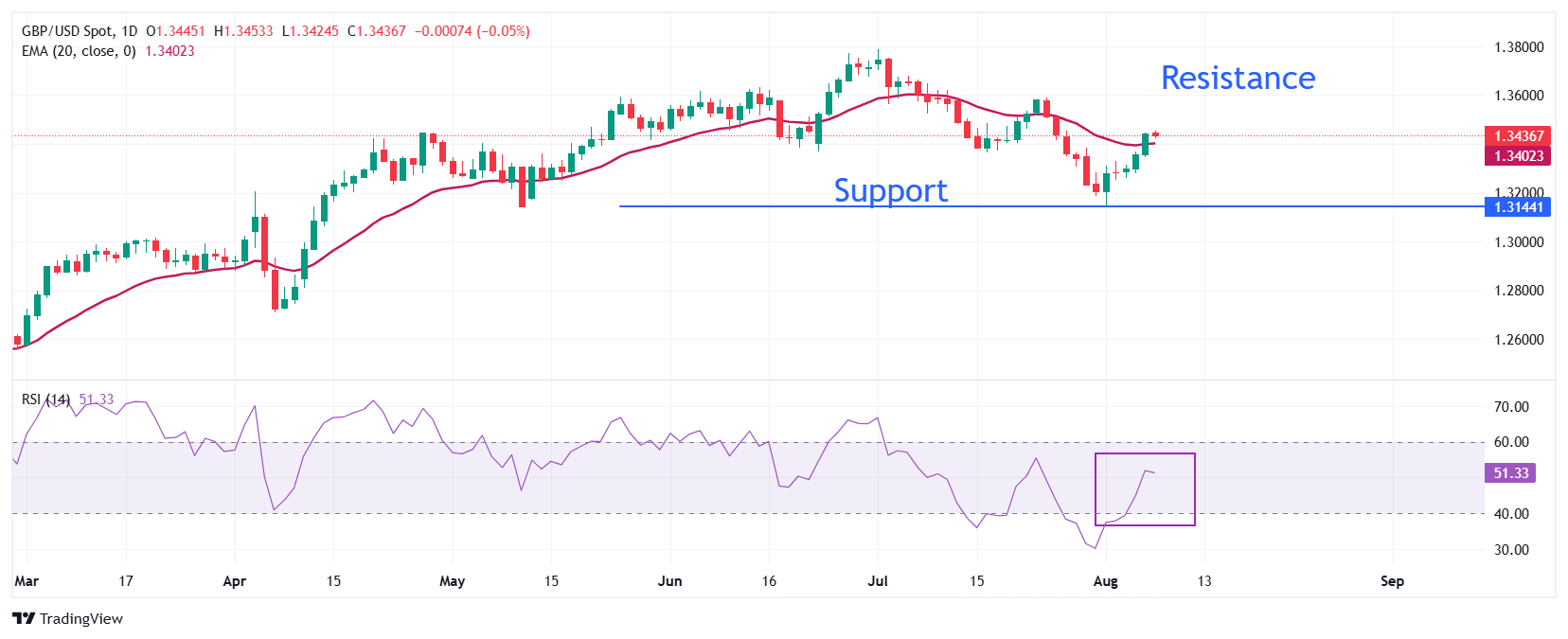Created
: 2025.08.08














![]() 2025.08.08 16:43
2025.08.08 16:43
The Pound Sterling (GBP) holds onto Thursday's gains during the European trading session on Friday as traders pare bets supporting interest rate cuts by the Bank of England (BoE) after the monetary policy announcement on Thursday, in which officials decided to cut rates but after a very tight vote.
The data from money markets shows that traders see a 17 basis points (bps) interest rate reduction in the remainder of the year, suggesting that the BoE will hold interest rates at their current levels until 2026.
On Thursday, the BoE reduced its key borrowing rates by 25 basis points (bps) to 4%, as expected, but the decision was taken by a very slim majority, something that markets hadn't expected. Out of the nine members of the Monetary Policy Committee (MPC), five supported a rate cut, fewer than the seven anticipated by economists. Moreover, the initial vote split was an unprecedented 4-4-1, with four members favouring a hold and one opting for a 50 basis point cut. A second vote was needed to reach the final 5-4 majority to cut rates by 25 basis points, something never seen before.
In the statement following the decision, the BoE maintained the wording of a "gradual and careful" approach to further easing of monetary policy.
BoE Governor Andrew Bailey stated that the central bank is committed to bringing inflation sustainably to the 2% target. Bailey warned that rising food and energy prices are de-anchoring consumer inflation expectations, the labor market is softening and the growth outlook is subdued. The BoE raised one-year forward Consumer Price Index (CPI) projections to 2.7% from the 2.4% previously expected.
Friday's economic calendar is empty, except for Bank of England Chief Economist Huw Pill's commentary in the National MPC Agency briefing at around 11:15 GMT. His words could be worth noting, considering the different perspectives on rates within the BoE as Pill voted to keep rates unchanged.
Looking at next week, investors shift their focus to the United Kingdom (UK) labor market data for the three-months ending June, which is scheduled to be released on Tuesday.

The Pound Sterling clings to gains around 1.3450 against the US Dollar during European trading hours on Friday. The near-term trend of the pair has turned bullish as it has climbed back above the 20-day Exponential Moving Average (EMA), which trades around 1.3402.
The 14-day Relative Strength Index (RSI) bounces back above 50.00 after oscillating inside the 20.00-40.00 range in the past few trading sessions, suggesting an attempt for bullish reversal.
Looking down, the August 1 low of 1.3140 will act as a key support zone. On the upside, the July 23 high near 1.3585 will act as a key barrier.
The Pound Sterling (GBP) is the oldest currency in the world (886 AD) and the official currency of the United Kingdom. It is the fourth most traded unit for foreign exchange (FX) in the world, accounting for 12% of all transactions, averaging $630 billion a day, according to 2022 data. Its key trading pairs are GBP/USD, also known as 'Cable', which accounts for 11% of FX, GBP/JPY, or the 'Dragon' as it is known by traders (3%), and EUR/GBP (2%). The Pound Sterling is issued by the Bank of England (BoE).
The single most important factor influencing the value of the Pound Sterling is monetary policy decided by the Bank of England. The BoE bases its decisions on whether it has achieved its primary goal of "price stability" - a steady inflation rate of around 2%. Its primary tool for achieving this is the adjustment of interest rates. When inflation is too high, the BoE will try to rein it in by raising interest rates, making it more expensive for people and businesses to access credit. This is generally positive for GBP, as higher interest rates make the UK a more attractive place for global investors to park their money. When inflation falls too low it is a sign economic growth is slowing. In this scenario, the BoE will consider lowering interest rates to cheapen credit so businesses will borrow more to invest in growth-generating projects.
Data releases gauge the health of the economy and can impact the value of the Pound Sterling. Indicators such as GDP, Manufacturing and Services PMIs, and employment can all influence the direction of the GBP. A strong economy is good for Sterling. Not only does it attract more foreign investment but it may encourage the BoE to put up interest rates, which will directly strengthen GBP. Otherwise, if economic data is weak, the Pound Sterling is likely to fall.
Another significant data release for the Pound Sterling is the Trade Balance. This indicator measures the difference between what a country earns from its exports and what it spends on imports over a given period. If a country produces highly sought-after exports, its currency will benefit purely from the extra demand created from foreign buyers seeking to purchase these goods. Therefore, a positive net Trade Balance strengthens a currency and vice versa for a negative balance.
![]()
Created
: 2025.08.08
![]()
Last updated
: 2025.08.08

FXStreet is a forex information website, delivering market analysis and news articles 24/7.
It features a number of articles contributed by well-known analysts, in addition to the ones by its editorial team.
Founded in 2000 by Francesc Riverola, a Spanish economist, it has grown to become a world-renowned information website.
We hope you find this article useful. Any comments or suggestions will be greatly appreciated.
We are also looking for writers with extensive experience in forex and crypto to join us.
please contact us at [email protected].
Disclaimer:
All information and content provided on this website is provided for informational purposes only and is not intended to solicit any investment. Although all efforts are made in order to ensure that the information is correct, no guarantee is provided for the accuracy of any content on this website. Any decision made shall be the responsibility of the investor and Myforex does not take any responsibility whatsoever regarding the use of any information provided herein.
The content provided on this website belongs to Myforex and, where stated, the relevant licensors. All rights are reserved by Myforex and the relevant licensors, and no content of this website, whether in full or in part, shall be copied or displayed elsewhere without the explicit written permission of the relevant copyright holder. If you wish to use any part of the content provided on this website, please ensure that you contact Myforex.
Myforex uses cookies to improve the convenience and functionality of this website. This website may include cookies not only by us but also by third parties (advertisers, log analysts, etc.) for the purpose of tracking the activities of users. Cookie policy